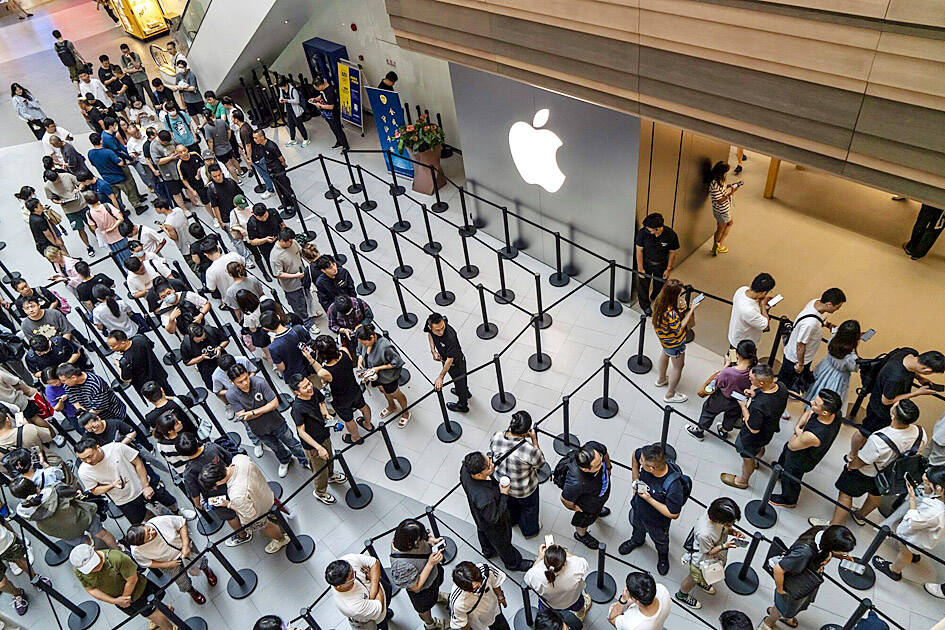Apple Inc is facing an unprecedented challenge: Persuading customers to buy its latest iPhones without their biggest new feature.
Apple yesterday launched the iPhone 16 lineup in almost 60 countries, including Taiwan, the US, China, India, Australia and South Korea. However, the device does not come installed with Apple Intelligence — the much-anticipated artificial intelligence (AI) software that the company has been touting since June. That means users would have to download the software features over time as they become available during the coming weeks and months.
That has put Apple in a tricky spot. It is already marketing the AI features heavily, but some consumers might hold off on buying the new phones if they cannot enjoy the benefits right away. The new iPhone hardware, meanwhile, has only modest upgrades from prior models. A touch-sensitive camera control button that makes it easier to take pictures and video is the most notable change.

Photo:Bloomberg
Even so, Wall Street remains bullish that Apple can accelerate its growth during the all-important holiday season. Analysts estimate that revenue would increase 8 percent in the fourth quarter — the best showing for that period since the end of 2021.
The new lineup includes two standard models — the 16 and 16 Plus — as well as the higher-end Pro and Pro Max. Preorders of the devices began last week, with shipments to stores and customers getting underway yesterday.
It is rare to see huge crowds of iPhone shoppers at Apple stores these days, but some diehard fans lined up at locations around the world ahead of the launch. The big question is whether ordinary consumers snap up the new model as well.
The initial units going on sale would run the iOS 18 operating system, but Apple Intelligence would require an over-the-air update to the iOS 18.1 software, which is launching next month.
Apple Intelligence was announced in June at the company’s Worldwide Developers Conference and has been available in a limited beta test for developers for the past several weeks.
Apple on Thursday released a public beta version of Apple Intelligence — one aimed at a wider audience — though most customers would not access it until the suite of features is released in its final form next month. Additional capabilities would not be ready until later, part of a staggered launch that would stretch into next year.
When the technology titan introduced the iPhone 16 line, it said that the devices were the first to be built “from the ground up” for Apple Intelligence. However, some iPhones from last year — the 15 Pro and Pro Max — would be able to support the features.
The look of the new phones is little changed from the iPhone 12 design from 2020. However, they feature noticeable battery-life improvements and camera advancements beyond the new button. Prices start at US$799 for the standard iPhone, ranging up to US$1,199 for the Pro Max.

Taiwan Semiconductor Manufacturing Co (TSMC, 台積電) last week recorded an increase in the number of shareholders to the highest in almost eight months, despite its share price falling 3.38 percent from the previous week, Taiwan Stock Exchange data released on Saturday showed. As of Friday, TSMC had 1.88 million shareholders, the most since the week of April 25 and an increase of 31,870 from the previous week, the data showed. The number of shareholders jumped despite a drop of NT$50 (US$1.59), or 3.38 percent, in TSMC’s share price from a week earlier to NT$1,430, as investors took profits from their earlier gains

In a high-security Shenzhen laboratory, Chinese scientists have built what Washington has spent years trying to prevent: a prototype of a machine capable of producing the cutting-edge semiconductor chips that power artificial intelligence (AI), smartphones and weapons central to Western military dominance, Reuters has learned. Completed early this year and undergoing testing, the prototype fills nearly an entire factory floor. It was built by a team of former engineers from Dutch semiconductor giant ASML who reverse-engineered the company’s extreme ultraviolet lithography (EUV) machines, according to two people with knowledge of the project. EUV machines sit at the heart of a technological Cold

Taiwan’s long-term economic competitiveness will hinge not only on national champions like Taiwan Semiconductor Manufacturing Co. (TSMC, 台積電) but also on the widespread adoption of artificial intelligence (AI) and other emerging technologies, a US-based scholar has said. At a lecture in Taipei on Tuesday, Jeffrey Ding, assistant professor of political science at the George Washington University and author of "Technology and the Rise of Great Powers," argued that historical experience shows that general-purpose technologies (GPTs) — such as electricity, computers and now AI — shape long-term economic advantages through their diffusion across the broader economy. "What really matters is not who pioneers

TAIWAN VALUE CHAIN: Foxtron is to fully own Luxgen following the transaction and it plans to launch a new electric model, the Foxtron Bria, in Taiwan next year Yulon Motor Co (裕隆汽車) yesterday said that its board of directors approved the disposal of its electric vehicle (EV) unit, Luxgen Motor Co (納智捷汽車), to Foxtron Vehicle Technologies Co (鴻華先進) for NT$787.6 million (US$24.98 million). Foxtron, a half-half joint venture between Yulon affiliate Hua-Chuang Automobile Information Technical Center Co (華創車電) and Hon Hai Precision Industry Co (鴻海精密), expects to wrap up the deal in the first quarter of next year. Foxtron would fully own Luxgen following the transaction, including five car distributing companies, outlets and all employees. The deal is subject to the approval of the Fair Trade Commission, Foxtron said. “Foxtron will be